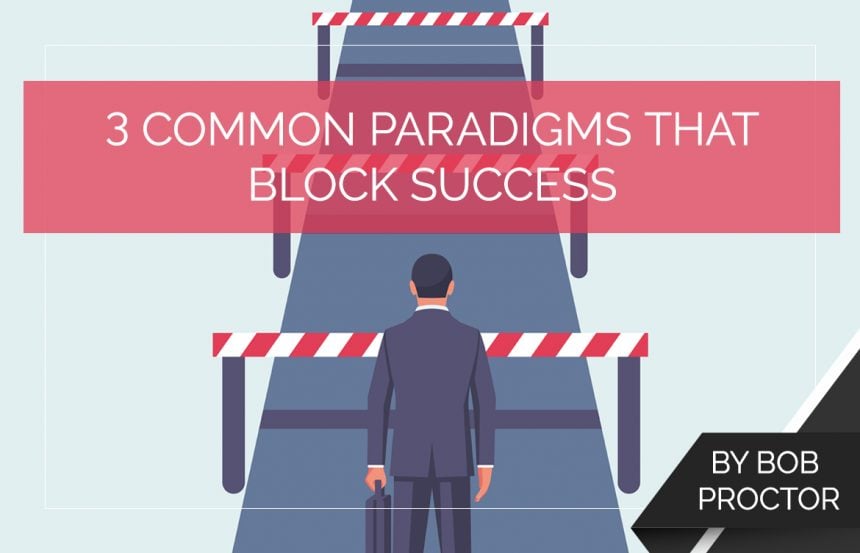This post isn’t just about you.
It’s also about me…
And most everyone else on the planet who wants to be, do or have more.
Throughout my life, I’ve faced plenty of success-blocking paradigms. However, of all my harmful paradigms, the most damaging thing I used to believe was:
What I think of myself doesn’t matter.
I thought what other people think of me was what would make or break me.
“They” would decide how much money I would make, what kind of relationships I could have, and how far I would go in life.
Now, I know that what I think of myself—my self-image—shapes and limits every area of my life.
So, as I continue to grow, I keep working on expanding my self-image to accommodate my desires.
But what about you…
What’s holding you back?
Paradigms are based on beliefs and habits that we have consciously or unconsciously chosen.
Our beliefs are internalized as fact until the day you decide to take a good hard look at them and evaluate whether they are true.
Here’s a list of 19 of the most common beliefs I’ve come across that block or limit success. Read through this list, and notice if any strike a chord in you:
1. I’m too old (or too young).
2. I’ll believe it when I see it.
3. I don’t have the money or resources.
4. I can’t.
5. I don’t have enough time.
6. I’ll never break through my income ceiling.
7. Change is too hard.
8. Not trying is better than failing.
9. I’ll never be successful.
10. I don’t deserve nice things.
11. There’s no point in dreaming big.
12. I’ll always be broke.
13. I don’t have the right education or experience.
14. I’m not important.
15. I’m not ready.
16. I’m not strong enough.
17. Everything is fine as it is.
18. I wasn’t born into the right kind of family.
19. I don’t deserve to be happy.
Did you recognize yourself in any of these?
Are there other limiting beliefs not mentioned here that popped in your head as you read the list?
What’s next?
By now, you should have an idea of what your limiting paradigm(s) may be.
Knowing what you’re dealing with is good, but if you want to continue to grow, you have to lead yourself outside of your paradigms.
To help you get started, take a look at how developing a new perspective on three of the paradigms listed above can help you start to shift your beliefs, thoughts, and behaviors and start experiencing more success and happiness.
1. Paradigm: I’ll believe it when I see it.
You want something that could potentially change your life. However, you’ve never done anything like it before, so you don’t think it’s possible for you. Even though you may continue to wish you had it, you don’t act on it because you can’t see yourself achieving it on your own.
Breakthrough Perspective: I’ll see it when I believe it.
Another way of thinking of this new perspective is you have to believe it to receive it.
Roger Bannister breaking the four-minute mile in 1954 is an example of how this works. No one had achieved this goal, yet deep in his heart, he believed he could. So, he trained for it, and he did it.
To adopt this new perspective, start by imagining what you want. Create a detailed picture of it as if it has already happened. Then, write “I’ll see it when I believe it” ten times, twice a day for 30 days. The Universe responds to what you believe, not to what you wish for.
2. Paradigm: I can’t.
“Can’t” is a common word that blocks your ability to grow and improve your life.
Every time you say, “I can’t,” you give away your power and diminish your capabilities.
Breakthrough Perspective: How can I?
If you don’t want to do something, it’s okay to say you can’t do it.
However, if you truly do want something and you’re saying you can’t do it because you’re scared or don’t know how to do it, you’re making yourself a victim of your circumstances
.
The next time “I can’t” comes to mind when you want to be, do, or have something, rise above your circumstances by asking “How can I…?”
This gives your mind a problem to solve. As you seek an answer, your mental faculties kick in, and your mind comes up with creative ideas that will help—not hinder—your success.
3. Paradigm: I’m not ready.
Have you ever seen someone who is standing at the edge of a pool, about to jump in say, “I’m not ready!”?
There they are, standing in their swimsuit, the water is good… how much more ready can you get?
There’s nothing wrong with planning for the future or taking the time to lay out a clear plan of action. However, if planning and preparation are all you do, this could indicate that fear is preventing you from moving forward.
This will hit home for you if you have a habit of waiting until everything is perfect before you do something that’s outside of your comfort zone. You may have an “I just have to do one more thing” attitude that prevents you from stepping up and out in life.
Breakthrough Perspective: All is well.
Sometimes we get so absorbed in making excuses about how things didn’t turn out the way we had hoped or expected, that we forget to focus on making the best of every situation — no matter what the outcome.
So, instead of being afraid of what will happen if you fail or make a mistake, after some preparation, tell yourself that all is well. Understand that you’ll be okay no matter what happens. Failure is no big deal—learn from it and keep going.
If Thomas Edison hadn’t failed thousands of times, he might not have become America’s most well-known and prolific innovator.
No matter what paradigm you are facing, you can shift to a new way of thinking and get new results.
What happens when you change your perspective
What do you see when you look at the illustration below?

At first, you might see a duck. However, if you shift your perspective, you’ll see a rabbit.
Whatever you perceive to be true about the illustration (i.e., it’s a duck or a rabbit) affects how you think, feel, and respond to it.
That’s the power of accepting a new perspective of your paradigm.
To your success,
Bob Proctor

